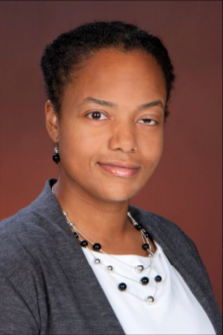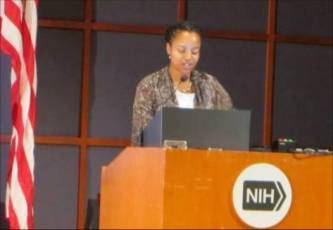Student Spotlight
Natalie Baptiste-Octave

Hometown: Brooklyn, New York
Degree Program: DrPH, Community Health Sciences concentration
Class Year: 2015 (year entered the DrPH program)
Undergraduate Major: Psychology
Graduate Degree(s) Received: MPH, Urban and Immigrant Health concentration, from SUNY Downstate Health Science University
Professional Interests: Strategic Planning in Population Health and Student Mentoring
Extracurricular Activities/Involvement: International Relief Aid volunteer with Helping Hands of CODESSCA Inc. and World Compassion Fellowship Inc.
1. What drew you to the DrPH program at SUNY Downstate Health Sciences University?
As an alumna of the School of Public Health, my experience while pursuing my MPH was so positive that it was an obvious choice, when seeking to return to school for a DrPH, to return to SUNY Downstate State Health Sciences University’s School of Public Health.
What initially drew me to the school was its location and partnerships. With an interest in health disparities, I knew that attending the School of Public Health at SUNY Downstate Health Sciences University located in Central Brooklyn would offer me direct opportunities to learn from and possibly positively impact the health disparities that existed in its surrounding communities. I also thought that since the school was affiliated with a hospital, medical school and various health related professional programs as well as many partnership in the community, my education at the School of Public Health would easily go beyond “the textbook” and directly in the field. I anticipated that there would not only be opportunities to learn from the well experienced faculty at the School of Public Health, but also the renowned professionals from the other schools, programs, and community partners.
What drew me to return to the School of Public health for a DrPH was primarily my experience with the faculty and staff at the school. I imagine all schools have accomplished faculty who conduct impressive research and staff who execute their roles efficiently. However, what has always stood out to me was how supportive and focused the faculty was in getting each student to successfully complete their degree and assist in preparing for the next step in a student’s education and/or career. Similarly, the school staff looks to get to know each student and never views a student as just another number. Just as the professors, the staff at the school is extremely supportive in helping students get the resources they may need to make their time at the school a smooth and successful one.
2. How has SUNY Downstate Health Sciences University’s School of Public Health helped you?
The School of Public Health has positively impacted the trajectory of my career. Not only was I provided with an introduction to all areas of public health through the program courses, but I received a strong foundation in my area of concentration. During my time as a student at the school, opportunities were created for me to gain “hands-on” experience while interning at the school’s partnering community-based organizations on federally funded research projects.
Since the school ensures that the core competencies of each course include the requirements that public health employers expect of applicants, I have been well prepared, qualified and even sought after for exciting public health program leadership positions at hospitals, community-based organizations and government agencies.
 When I first entered the school of public health, I was quite timid when it came to
public speaking. However, it is expected when working in the field of public health
that many positions will involve public speaking. Knowing this, the school incorporates
occasions for public speaking and oral presentations in just about each course which
not only strengthened my presentation skills but has impressed each of my employers
which affords me the opportunity to deliver oral presentations representing my employers
at local, regional, and even national conferences.
When I first entered the school of public health, I was quite timid when it came to
public speaking. However, it is expected when working in the field of public health
that many positions will involve public speaking. Knowing this, the school incorporates
occasions for public speaking and oral presentations in just about each course which
not only strengthened my presentation skills but has impressed each of my employers
which affords me the opportunity to deliver oral presentations representing my employers
at local, regional, and even national conferences.
3. What was your most influential moment as a public heath student at SUNY Downstate?
As an MPH student I also worked as a patient recruiter for cancer clinical trials, I noticed that we were having difficulty with new accruals to trials. Although it was not part of my job description at the time, I carried out a community needs assessment and identified several practical barriers faced by potential subjects at the Downstate Medical Center and Kings County Hospital. I was able to identify recurring themes in these barriers, which I brought to the attention of the Principal Investigator of our research project. Thereafter, I made suggestions on how those barriers could be overcome. Funds were identified to test the suggestions, which proved to be successful in increasing accruals. The suggestions resulting from my work became part of our research project’s standard protocol, and I was also afforded the opportunity to present our results to physicians and other medical professionals at regional and national conferences.
4. Could you describe your work experience?
After working as a senior manager of a community partnerships department at a leading healthcare organization for 3 years, I accepted an opportunity to work for the New York City Department of Health and Mental Hygiene (DOHMH) as a City Research Scientist in 2017.
In my first role at the DOHMH I was responsible for overseeing the design, implementation and evaluation of programs focused on eliminating Hepatitis C among HIV patients at 10 local hospitals and community health centers. This entailed meeting regularly with the leadership of the various hospitals and health centers to guide their designated teams through designing, implementing, and evaluating the program. I was also responsible for developing the reports that would be referred to by city council officials as well as representatives from the federal government such as Health Resources and Services Administration (HRSA) and the Centers for Disease Control and Prevention (CDC) for updates on each of the hospital’s and health center’s program status.
Upon the successful completion of that project, in January 2020, I began working in a different area at the DOHMH which focuses on asthma management in school-aged children. I am currently part of the team developing implementation strategies and designing evaluation tools for some of the asthma related initiatives at the DOHMH.
Once the DOHMH became activated for service in response to the covid-19 pandemic, I additionally took on a management role at the agency where I currently work in collaboration with the New York City Health + Hospitals and community leaders for all public facing messaging on T2 covid-19 which includes campaigns and ads around covid-19 testing, tracing, hoteling and take care packages. Both roles have been quite exciting and rewarding.
5. What are your goals? Do you have plans to further your education or do you have a career in mind upon graduation?
I believe I will continue with my current career path. However, I do hope to have opportunities to mentor the next generation of public health professionals through teaching or perhaps academic advisement. However, for now, my priority is to complete my DrPH as I have already completed all the coursework and qualifying exams required of me through the DrPH program and am currently working on my dissertation.
6. What would you say to a potential student considering SUNY Downstate Health Sciences University’s School of Public Health for graduate school?
- While there is no perfect school, because of its diverse student population you will not only learn from the faculty and their experiences, but you will also learn from your classmates who come to the program with various relative experiences as traditional and non-traditional students.
- Realistically plan out the time that will be allocated to reviewing material and assignments outside of class time. Keep in mind that you will only get out of it what you put into it. So, plan in advance of even applying to the school what weekly time will be allocated to your studies in this program.
- Take advantage of the resources offered by the school and institution (e.g. the workshops, faculty advisor, lectures, volunteer opportunities etc.) All of this will enhance your experience at the school and possibly create future career opportunities for you.
- If you are not already working in the field of public health, look into applying early to summer internships at reputable public health agencies while you are enrolled in the school.